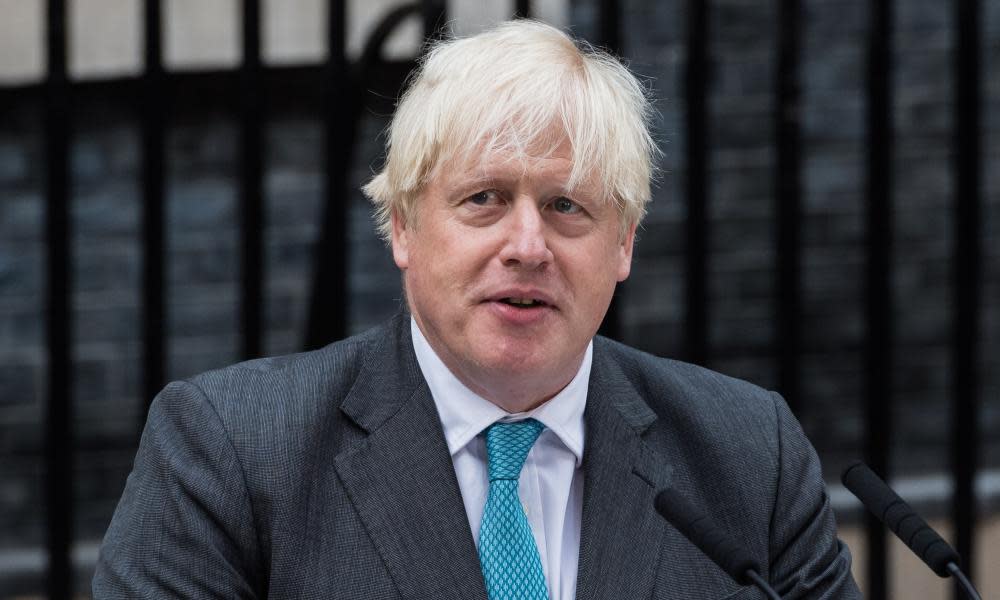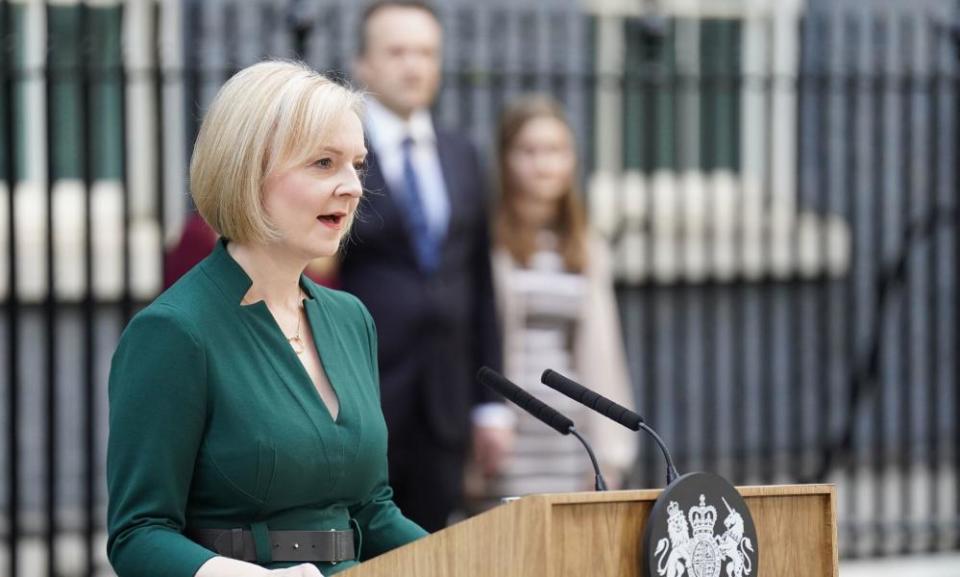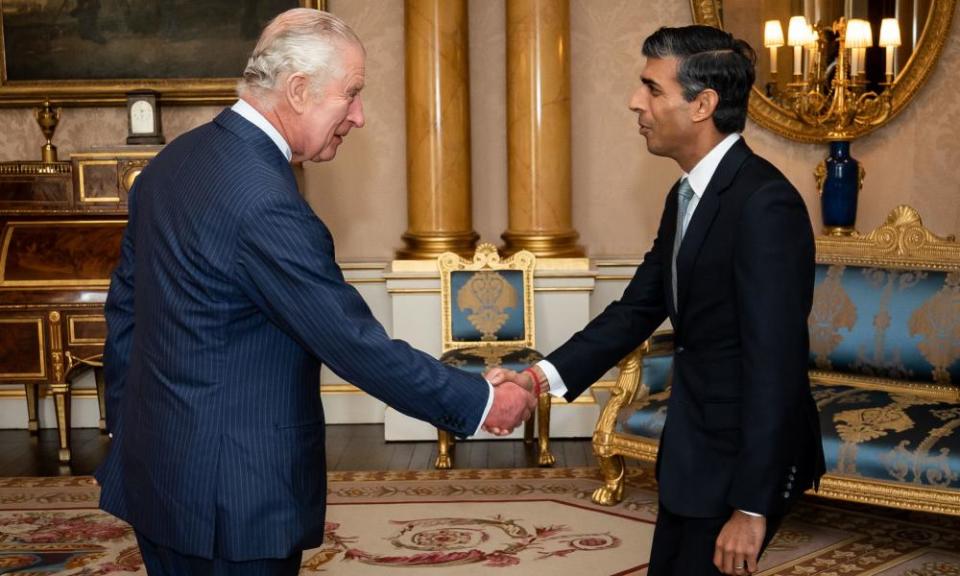After a year when the only certainty was Tory chaos, could 2023 be even worse?

Doctors assessing people for signs of dementia have traditionally asked their patients: “Who is the prime minister?” Some health professionals report that they stopped using that question this year. There has been so much manic mayhem at the apex of politics that it has been a struggle to keep up even for those in full possession of their faculties.
2022 was the year of two leadership coups, three prime ministers, four chancellors, five education secretaries, six fiscal events and more than 30 exits from the cabinet. The doors of Whitehall revolved so fast that ministers barely had time to hang up their coats before it was time to leave the building. The only certainty was chaos. I would call it laughable were not the consequences so dismal. A year of cascading scandals and whipsawing policies has also been 12 months in which vital public services have come dangerously close to collapse and food banks haven’t been able to cope with the demand for their help.
Political journalists have used the word unprecedented an unprecedented number of times and have been justified in doing so. Boris Johnson became the first prime minister to be convicted of breaking the law while in office, the first to be made the subject of a parliamentary inquiry into whether he lied to the Commons, and then the first to be sacked from Number 10 by his own ministers for lacking the basic probity to hold the office.
Those who thought that psychodrama had exhausted the Tory party’s capacity for unleashing havoc were soon proved wrong. The serial debauchery of the king of rogues was followed by the ruinous reign of the mad queen. Liz Truss became the briefest prime minister in our history while also being one of the most calamitous.

Through foreign eyes, and in the view of many of its own citizens, the UK used to be regarded as a place of stable and predictable governance. As Tory juntas came and went, our international reputation was more akin to that of a rotten banana republic, but one without the consolation of sunshine. Financial markets started applying a “moron premium” to the price of lending to Britain. The mourning for the Queen was accentuated by the sense that she represented duty, responsibility and solidity, qualities entirely absent from the country’s government. And all this under the Conservatives whose calling card with the electorate was once the claim to be the grownups. The Tories have exhibited the decadence that is often a feature of parties that have been in office for a long stretch, while also behaving with the puerility of a drunken gang of juvenile delinquents trashing the public square. The pressure of events would be a generous explanation for why it has been anarchy in the UK under the punk Tories. For sure, the debilitating legacy of the pandemic was compounded by Vladimir Putin’s brutal invasion of Ukraine, which added fuel to an explosion of inflation. Yet this won’t do as an alibi because Britain was far from alone in being afflicted by global forces. They have stress-tested governments of various stripes around the world without unleashing the incessant turmoil seen here.
The breakdown of government cannot be explained by parliamentary arithmetic. This time three years ago, the Conservatives won the biggest vote share at the 2019 election, which first-past-the-post translated into one of the larger majorities secured by a postwar government. Even after a pummelling series of byelection defeats at the hands of disgusted voters, the Tories are in possession of a hefty majority in the Commons. It’s not disruption by the opposition parties that has destabilised the governance of Britain but the Conservative party itself.
No explanation can overlook Brexit, a rupture unique to this country and one that has left Britons poorer than they need have been, while scrambling the synapses of the Conservative party responsible for it. Between 1979 and the referendum in 2016, a span of 37 years, the UK had five prime ministers. There have been as many in the six years since. I have heard some argue that this accelerated churn demonstrates that the premiership has become an “impossible job” that will destroy anyone foolish enough to have a go at it. I don’t buy this. There have been other periods of our history that placed demands on leaders that were as heavy, if not heavier, as those today. What has become impossible is finding anyone in the Tory ranks capable of managing that dysfunctional party, never mind giving fruitful leadership to the country.

A sequence of successively worse prime ministers has crashed and burned because they promised things they couldn’t deliver. The smooth but shallow David Cameron glibly gambled that his Brexit referendum would resolve his party’s civil war over Europe and settle Britain’s relationship with its continent. He self-immolated his premiership when he failed on both counts. The workaholic but wobbly Theresa May pledged to find a do-able Brexit that would satisfy parliament and spent three miserable years being defeated. The costless route to the sunlit uplands promised by the mendacious Mr Johnson was a rocky road descending into a dark ravine. He was finally ejected when even Tory MPs tired of his lies, but his party had become incorrigibly addicted to populism, boosterism and cakeism. So the Tories then put the country in the hands of Ms Truss, another chancer peddling tickets to another flight to fantasyland. Her pitch to her party was that she could deliver the elusive dividends of Brexit. She scoffed at the peril that her prospectus of unfunded tax cuts would accelerate inflation, balloon debt and spook markets. “Project fear”, she sneered, a conscious echo of the line used to dismiss the warnings of Remainers before the referendum. For a second time, the Brexit-addled Tories awarded the premiership to someone manifestly unfit for it. Tory MPs like to blame party activists for the spectacular debacle of the Truss premiership, but they put her name on the ballot as they had Mr Johnson. The consequences caught up with them more rapidly this time. She flamed out after 50 nights in Downing Street when her miracle elixir for the economy transpired to be snake oil laced with poison.
This cycle of leadership boom and bust has been accompanied by vicious purges as the so-called Brexit revolution devoured itself. The pool of Tory talent has been drained, especially of Conservatives of more decent and sensible character, many of whom have been ejected from the party or abandoned it in despair. Both Mr Johnson and Ms Truss appointed governments in which slavish loyalty to the leader was regarded as a much more important qualification for running a department than judgment, integrity and competence. He put together a cabinet stuffed with nodding dogs; she surrounded herself with nodding donkeys. So 2022 has been a year of extreme misgovernance, but it is best interpreted not as a shockingly unexpected aberration, but the culmination of forces unleashed since 2016.
One byproduct of so much chaos has been violent swings in the fortunes of Tory personalties. Of no one is this more true than Rishi Sunak, whose status ricocheted from heir-apparent to busted flush to comeback kid. He began the year as the man most likely to be the next prime minister only then to be near-fatally wounded by the exposure of his wife’s exploitation of non-dom status. He wielded the dagger against Mr Johnson only for the crown to be grabbed by Ms Truss. The plot then delivered its most extraordinary twist when she self-imploded and he succeeded her without a vote.
Despite this surreal route to the top – an ascent in which the public had absolutely no say – Mr Sunak arrived at Number 10 with the promise that he would draw a line under Tory anarchy and restore orderly government to Britain. “Boring is back” was the motto promoted by some of his supporters. Yet the doom loop of self-perpetuating crisis is not over. In the brief time he has been at the helm, the latest Tory prime minister has presided over yet more chaos as strikes have spread from the railways to the NHS and many other essential services.
Mutinous Conservative MPs are already chuntering that, if their prospects aren’t looking up by the spring, Mr Sunak will find himself putsched out of Downing Street next year. And the name you are most likely to hear bandied about as his replacement? Alexander Boris de Pfeffel Johnson. That this is even being talked about tells us that the dementia of the Conservative party has reached a very advanced stage.
• Andrew Rawnsley is Chief Political Commentator of the Observer

 Yahoo News
Yahoo News 
